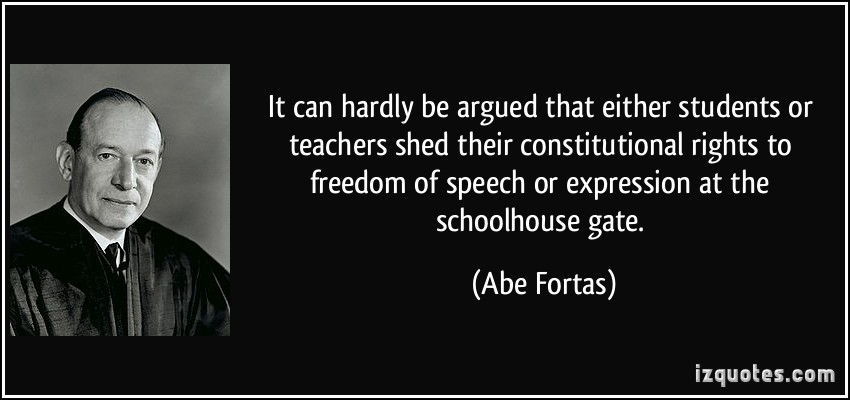11 Bonus Chapter: Legal Issues in Teaching
Guiding Questions for Bonus Chapter
- What are the sources of laws, policies, and regulations that govern public schools and teachers?
Introduction
Teachers and students do not “shed their constitutional rights to freedom of speech or expression (or other constitutional rights) at the schoolhouse gate.” Most of the laws, policies, and regulations that apply in your everyday life also apply in your role as a teacher. The school, however, is a special place with a unique mission. So, the law protects and limits teachers and students— especially in public schools—a little differently. In this chapter, you will learn about the sources of education law, common legal issues that teachers confront, and a few Supreme Court cases that exemplify legal reasoning in the public schools.
Legal Issues in Teaching
Teachers, like other people, are governed by a variety of laws, policies, and regulations. In this chapter, we want to become familiar with the ways in which the law regulates and protects you as a teacher.
Preliminary Issues
The sources and issues of education law differ for teachers at public and private schools. Our constitutions—both federal and state—are designed to limit and and empower the government. In a public school, a teacher is considered an actor of the government. As a government actor, the federal and state constitutions apply to you. So, for example, a public school teacher is constitutionally prohibited from inviting a student to attend church (that would be a violation of the Establishment Clause of the First Amendment); a private school teacher is not.
Another preliminary note important for teachers to consider is that law not only limits and regulates your actions as a teacher, it also protects and empowers you as a teacher.
Teachers retain their rights as citizens in a public school environment, but those rights are altered. Public school teachers enjoy, for example, the right to freedom of expression, but they cannot promote a personal political agenda in the classroom. Teachers also enjoy freedom of association,privacy, and a limited right to academic freedom.
Finally, teachers not only need to be aware of how the law affects them, they also need to know how the law impacts their students.
Sources of Education Law
The article below is a great place to start exploring the laws, regulations, and policies that govern you as a teacher.
- Federal and State Constitutional Law
- Federal and State Statutory Law
- Federal and State Regulations
- School Board Policy
- Case Law
Common Legal Issues for Teachers
The article below describes the most common legal issues that teachers confront and those that should be a part of teacher preparation.
- Student Issues
- Student Expression
- Religion in the Schools
- Employment Issues
- Teacher Dismissal
- Teacher Expression
- Employment Discrimination
- Collective Bargaining
- Other Legal Issues
- Special Education
- Teacher Liability
- Harassment/Abuse
- Student Discipline
- Instructional Issues
Common Legal Issues for Teachers
Bong Hits 4 Jesus: An Example Case
Read: Zirkel, Perry A. 2007. “Bong Hits?” Phi Delta Kappan 89 (2): 158–59.
Do you agree or disagree with the Court’s ruling?
Your Turn
T.L.O. was a high school student. School officials searched her purse suspecting she had cigarettes. The officials discovered cigarettes in the outside pocket of her backpack. They continued to search and found a small amount of marijuana, and a list containing the names of students who owed T.L.O. money. T.L.O. was charged with possession of marijuana.
Was the search consistent with the Constitution?


